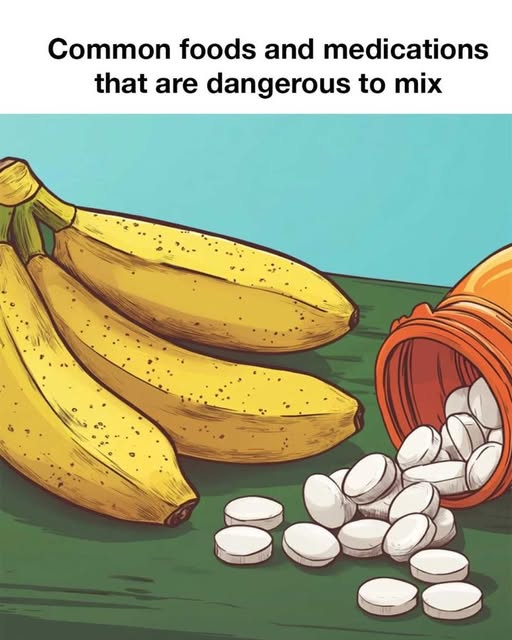
Understanding how certain foods interact with medications is crucial for ensuring their effectiveness and safeguarding your health. Some food-drug combinations can diminish medication efficacy or lead to adverse side effects. By being aware of these interactions, you can make informed dietary choices that complement your treatment plans.
1. Grapefruit and Cholesterol Medications
Grapefruit and its juice can interfere with statins, medications prescribed to lower cholesterol levels. Compounds in grapefruit increase the absorption of these drugs into the bloodstream, potentially leading to severe muscle damage and liver complications. It’s advisable to avoid grapefruit products while on statin therapy.
2. Leafy Greens and Blood Thinners
Vegetables like spinach and kale are high in Vitamin K, which plays a role in blood clotting. When taking anticoagulants such as warfarin, consuming large amounts of these greens can counteract the medication’s effectiveness, increasing the risk of clot formation. Maintaining a consistent intake of Vitamin K-rich foods helps manage this interaction.
3. Dairy Products and Certain Antibiotics
Calcium in dairy products can bind with antibiotics like tetracycline and ciprofloxacin, reducing their absorption and effectiveness. To prevent this, it’s recommended to consume dairy products either two hours before or after taking these antibiotics.
4. Bananas and Blood Pressure Medications
Angiotensin-converting enzyme (ACE) inhibitors are used to treat high blood pressure and can increase potassium levels in the body. Eating potassium-rich foods like bananas while on these medications may lead to hyperkalemia, a condition characterized by excessively high potassium levels. Monitoring potassium intake is essential when on ACE inhibitors.
5. Alcohol and Pain Relievers
Combining alcohol with pain relievers such as acetaminophen or non-steroidal anti-inflammatory drugs (NSAIDs) can amplify side effects, leading to liver damage or gastrointestinal bleeding. It’s prudent to limit or avoid alcohol consumption when using these medications.
6. Chocolate and Antidepressants
Monoamine oxidase inhibitors (MAOIs), a class of antidepressants, can interact negatively with tyramine, a substance found in chocolate. This combination may cause dangerously high blood pressure. Individuals on MAOIs should be cautious with their chocolate intake.
7. Coffee and Certain Medications
Caffeine in coffee can affect the metabolism of various medications, including some antidepressants like lithium, potentially reducing their efficacy. Additionally, caffeine can influence the absorption of other drugs, necessitating moderation in coffee consumption during treatment.
8. Licorice and Blood Pressure Drugs
Natural licorice contains glycyrrhizin, which can lead to potassium depletion and elevated blood pressure, counteracting the effects of antihypertensive medications. It’s advisable to avoid licorice products if you’re managing high blood pressure.
9. Soy Products and Thyroid Medications
Soy products can interfere with the absorption of thyroid medications, diminishing their effectiveness. To ensure optimal absorption, consider consuming soy products several hours apart from your thyroid medication.
10. Cranberry Juice and Anticoagulants
Cranberry juice may enhance the effects of blood thinners like warfarin, increasing the risk of bleeding. Monitoring cranberry intake and consulting with a healthcare provider can help manage this potential interaction.
Being mindful of these food and medication interactions is vital for effective treatment and overall well-being. Always consult with healthcare professionals about potential dietary restrictions related to your medications, and maintain open communication to ensure safe and effective therapy.





